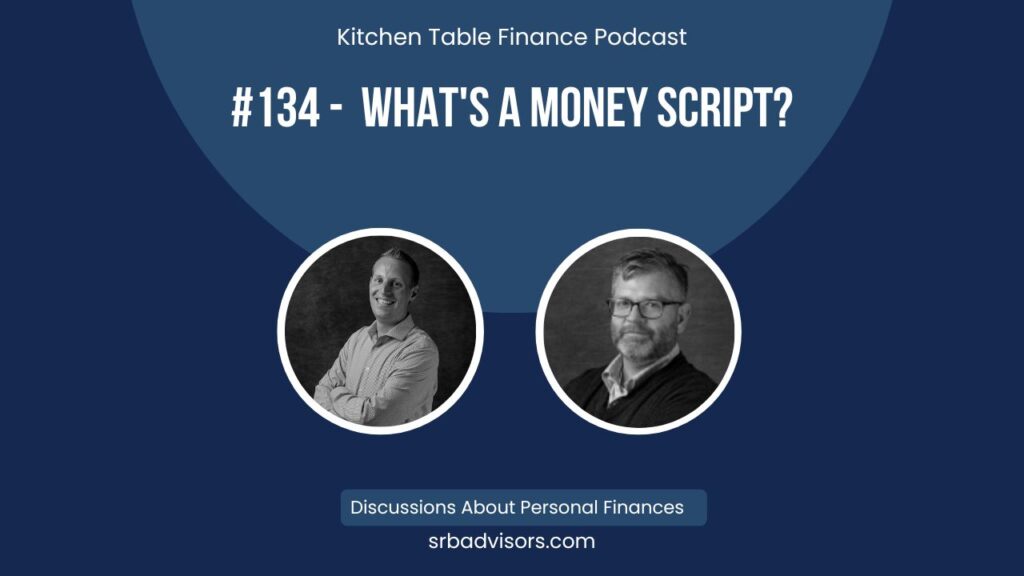Ep 134 – What’s a Money Script?

Podcast: Play in new window | Download
Join Nick and Dave as they talk about money scripts and how they might be affecting your financial plan. They also cover things that you can do to kind of recognize and move forward.
Watch on YouTube HERE
The guys also reminisce about their first memories of money.
Dave’s first memories involve the tooth fairy and separately, his grandfather. “I remember when I’d see my grandfather when I was young. He would always, no matter what was going on, he would hand us a dollar or $2 out of his wallet. He’d say that we should always have some walking around money. That has always kind of stuck with me. It was about having a little money that we didn’t have to account for or tell my mom about. It was just for some Jolly Ranchers or gum or whatever.”
Nick’s first memories about money when he was a kid had to do with a soccer ball piggy bank. “Every time we got money from the tooth fairy or from chores, I used to put all of my money into that little soccer ball and fill it up. My dad told me that I could save it for college. So sure enough I was putting all my change in there saving for college someday. I eventually took it to the bank and started a savings account.
What is a Money Script?
Money script is an unconscious belief that each of us has developed concerning money in life. It is typically formed in childhood. We get this from parents or family or society and it’s often incredibly strong and resistant to change.
A popular idiom is money doesn’t grow on trees.
Another one is, “If you’re a good person and right, the money will take care of itself.”
All these little bits of conventional wisdom form our Bedrock Beliefs about money and attitudes toward money. They can be different in different contexts and different for different people based on experience. This can affect your ability to enjoy money or it can cause us to avoid money issues in general.
For example, someone who grew up during the great depression might learn to always be frugal, even after they actually have to be. Or, the opposite could happen with someone who really struggled, and their takeaway was to go ahead and spend it because it may not be here tomorrow. They both had the same foundational experience of the great depression, but completely different takeaways.
The same thing can happen in the same family. For instance, your brother might have a completely different outlook on money even though you mostly had the same upbringing and heard the same stories as you did.
Common Money Scripts
- More money will make things better.
- Money is bad.
- I don’t deserve money.
- Money is the root of all evil.
- I’ve worked hard for this and now I should get to enjoy it.
- I deserve to spend money.
- There will never be enough money versus there will always be enough money.
- Money will give me meaning.
- It’s not nice to talk about money.
- If you’re good, the universe will supply all your needs.
- If you don’t work hard and persevere, you’re never going to get ahead.
All of these different mindsets come into play when we’re helping people with financial planning. It seems like we’re always trying to pull clients back towards the middle somehow and find balance. They are typically either too afraid to spend or they’re spendthrifts.
Take the quiz about money scripts we discussed in the show HERE.
Can you change your money scripts?
Yes, money scripts can be changed. The first step is identifying and understanding them. This is the cognition phase and it can help most money scripts dissipate or at least lessen the impact on your financial life.
There are certain scripts you may need professional help or guidance to kind of detach those emotions from the script.
Here’s an example:
Patty makes $200,000 a year. She owns a small business. She has about $500.000 in savings.
From the outside, it looks like she’s doing a great job and things are going well for her. But when you unpack it one of the things that you find is that her mother was her former business manager and she embezzled over $400,000 from her. This sort of thing can create a money script such as, “If you can’t trust your mom with money who can you trust?”
Listen or watch the full episode to learn more about money scripts, how to recognize them, and how to change them in order to achieve your financial goals and improve your relationship with money.
About Shotwell Rutter Baer
Shotwell Rutter Baer is proud to be an independent, fee-only registered investment advisory firm. This means that we are only compensated by our clients for our knowledge and guidance — not from commissions by selling financial products. Our only motivation is to help you achieve financial freedom and peace of mind. By structuring our business this way we believe that many of the conflicts of interest that plague the financial services industry are eliminated. We work for our clients, period.
Click here to learn about the Strategic Reliable Blueprint, our financial plan process for your future.
Call us at 517-321-4832 for financial and retirement investing advice.
Share post:
